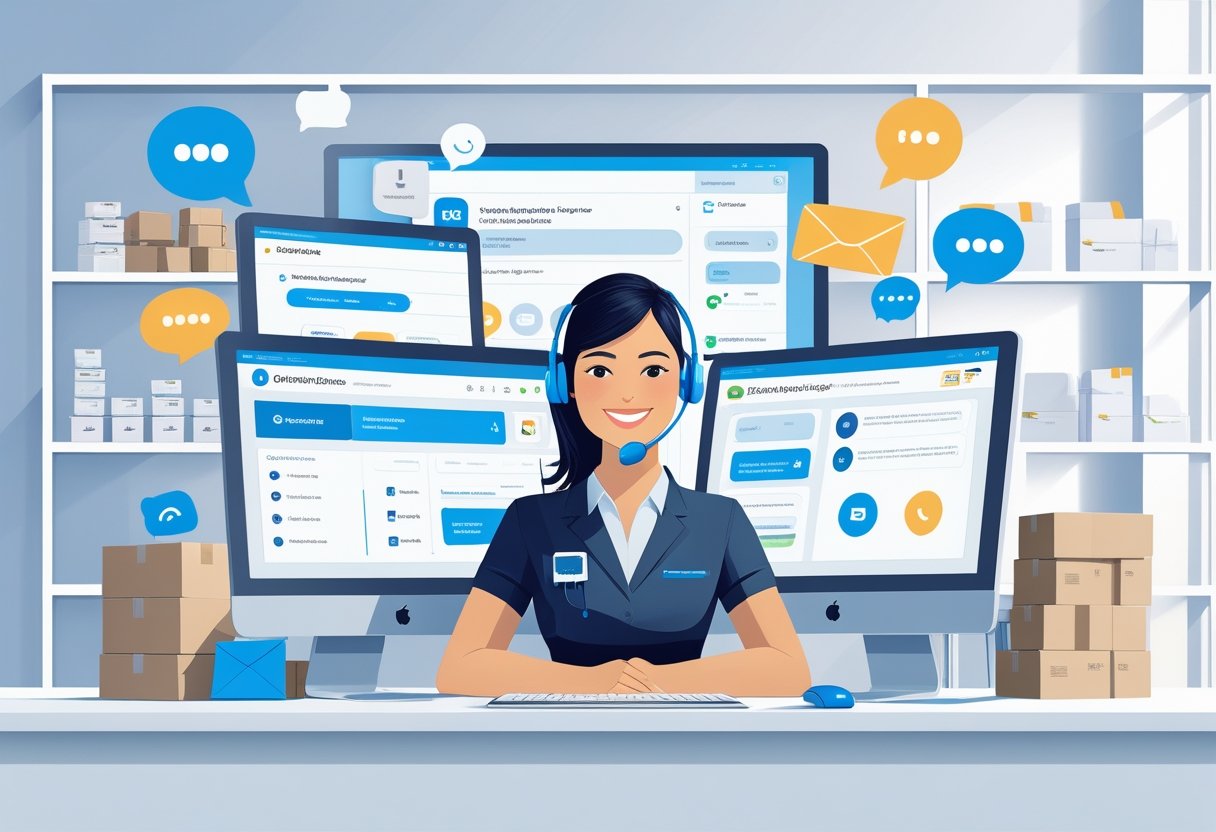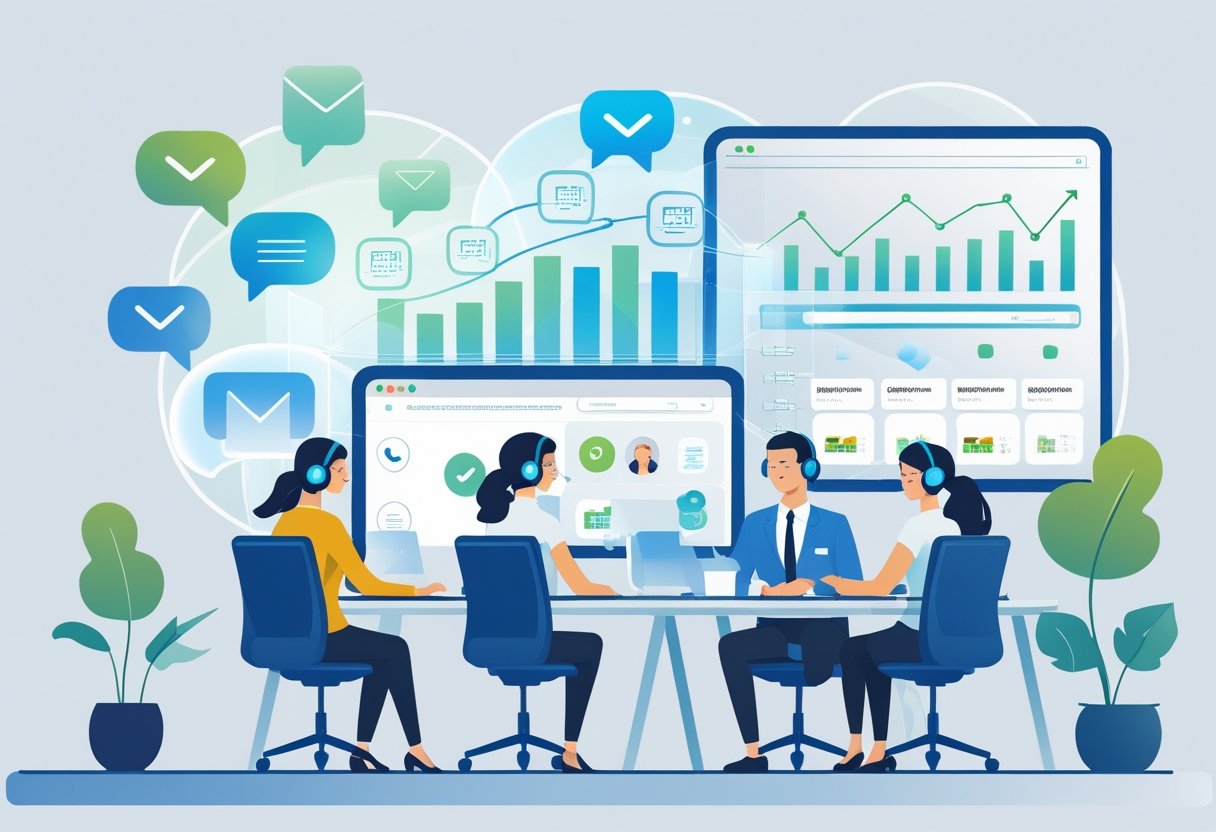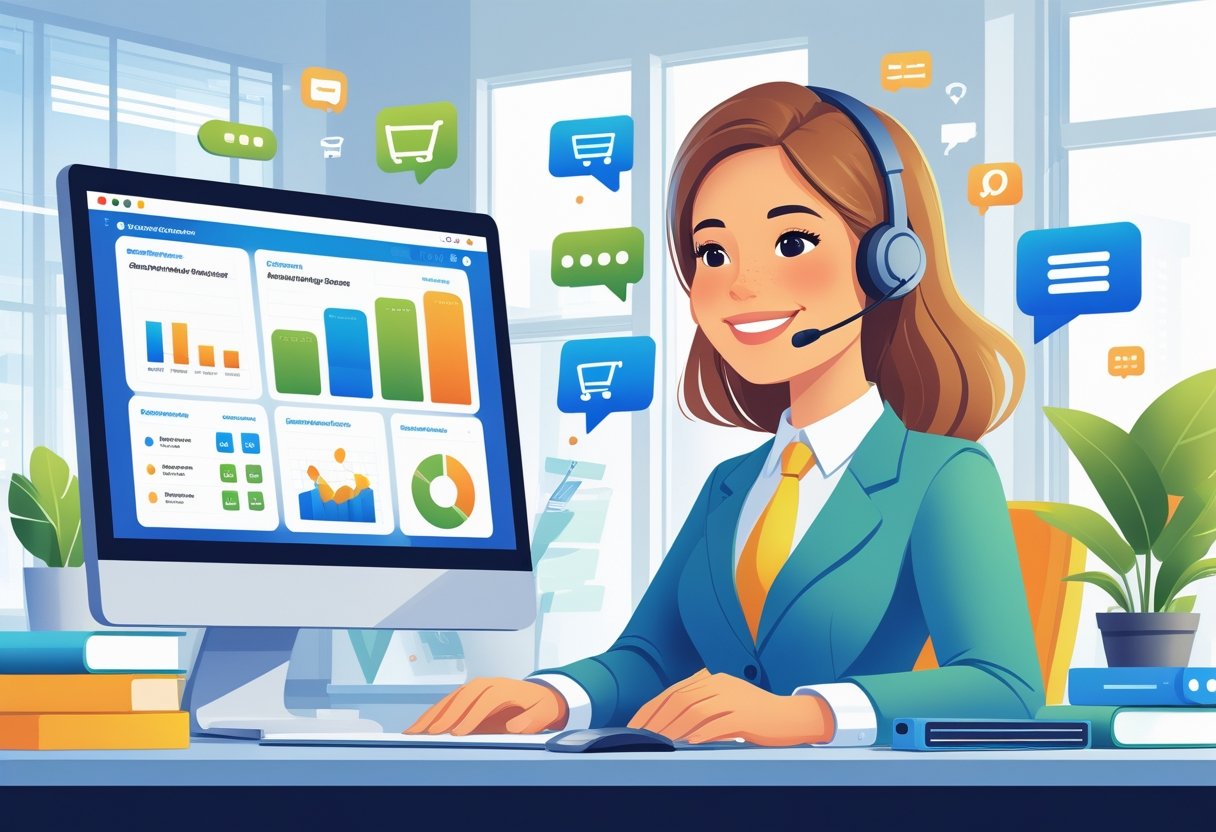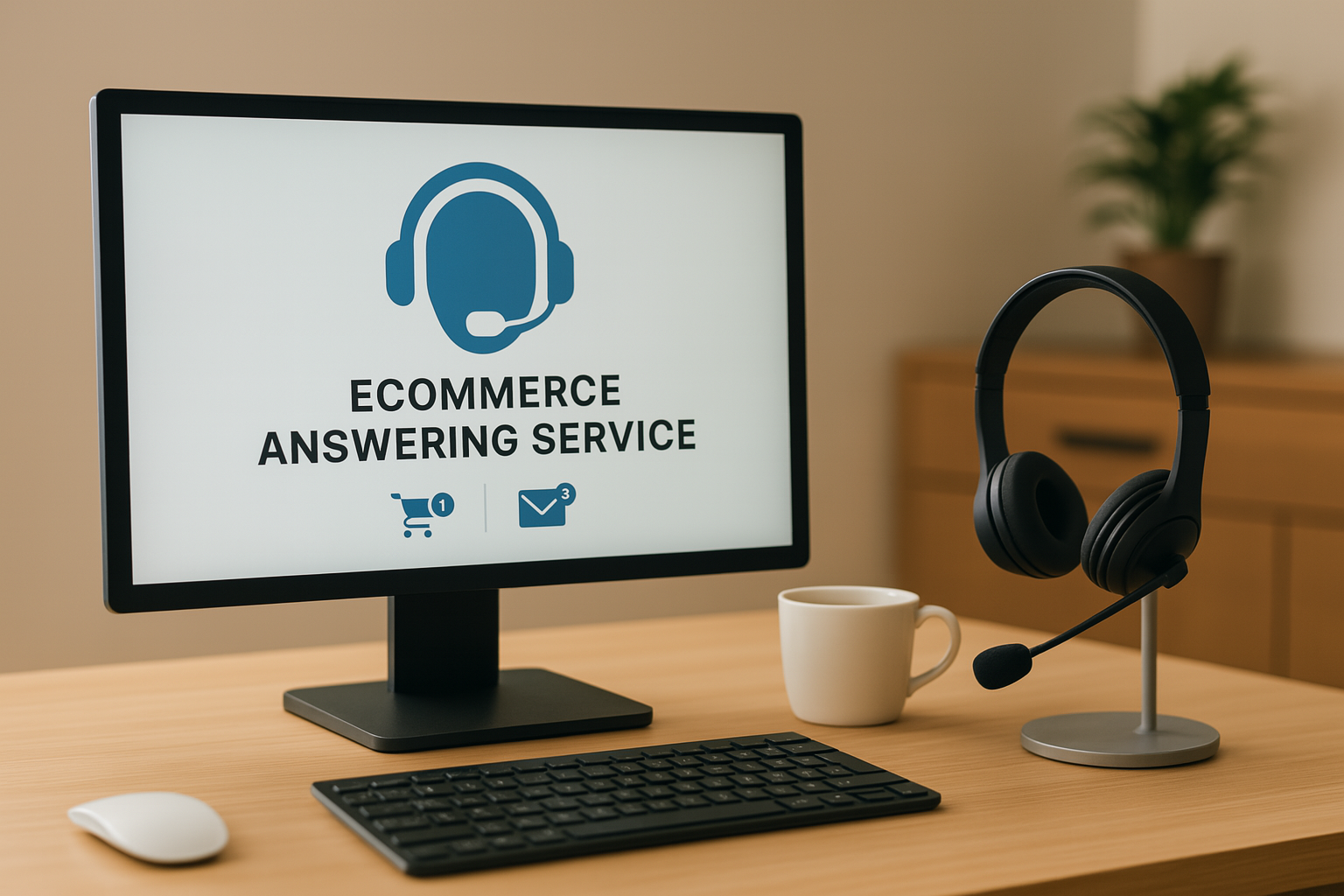Ecommerce Answering Service: Essential Guide for Online Brands
Running an online store means dealing with customer calls at all hours, from order questions to shipping concerns. Missing these calls can cost sales and hurt customer trust. An ecommerce answering service handles incoming calls and messages for online businesses, providing professional customer support when store owners and their teams can't answer directly.

These services go beyond basic voicemail systems. They use trained staff or AI technology to have real conversations with customers about products, policies, and orders. Many offer 24/7 coverage, which helps businesses serve customers across different time zones and during peak shopping hours.
The right answering service can boost sales while reducing stress for business owners. Understanding how these services work, what benefits they provide, and how to choose the best option can help online retailers improve their customer experience and grow their business.
Key Takeaways
- Ecommerce answering services provide professional call handling that goes beyond simple message-taking to actively support sales and customer service
- These services offer 24/7 availability and can significantly reduce missed opportunities while improving customer satisfaction
- Success depends on choosing a provider that integrates well with existing systems and following proper setup practices
What Is an Ecommerce Answering Service?
An ecommerce answering service is a third-party solution that handles customer communications for online businesses. These services manage phone calls, live chats, and messages to provide professional customer support around the clock.
Definition and Core Features
An ecommerce answering service acts as a virtual customer service team for online retailers. It manages incoming calls, chats, and messages from customers who need help with their shopping experience.
These services handle various tasks that keep e-commerce businesses running smoothly. They answer product questions, process orders, track shipments, and resolve customer complaints. Many services also help with technical issues during the checkout process.
Key features include:
- 24/7 customer support availability
- Live chat and phone call management
- Order processing assistance
- Product information support
- Integration with e-commerce platforms like Shopify
The service connects directly with existing business systems. This integration allows customer service representatives to access order history, inventory levels, and customer data in real-time.
Most answering services use both human agents and AI-powered tools. The AI handles simple questions while trained agents manage complex issues. This approach ensures customers get quick responses without sacrificing quality.
Call center technology enables these services to handle high volumes of inquiries. During busy shopping seasons or sales events, the service can scale up to meet increased demand without missing customer contacts.
Key Benefits for Online Businesses

Ecommerce answering services deliver measurable improvements in customer support quality, sales conversion rates, and operational efficiency. These services help businesses capture more revenue while building stronger customer relationships through professional communication.
Enhancing Customer Support Experiences
Professional answering services transform how online businesses interact with their customers. Trained operators handle inquiries with product knowledge and communication skills that match the brand's voice.
Customer service quality improves when experienced agents manage calls instead of overwhelmed staff members. These operators understand ecommerce processes and can resolve issues quickly.
Small businesses benefit most from this professional approach. They gain access to skilled customer service without hiring full-time staff.
Key improvements include:
- Faster response times to customer questions
- Consistent service quality across all interactions
- Professional handling of complaints and returns
- Reduced customer frustration with wait times
Enterprise companies use answering services to maintain service standards during high-volume periods. The service acts as a backup when internal teams reach capacity.
Customers notice the difference in service quality immediately. 73% of customers say valuing their time is the most important thing a company can do for good service.
24/7 Order Tracking and Assistance
Round-the-clock availability gives customers instant access to order information and support. This constant access reduces anxiety about purchases and builds trust in the business.
Order tracking becomes seamless when customers can call anytime for updates. Operators access order management systems to provide real-time status information.
Night and weekend coverage captures international customers in different time zones. This expanded availability increases the potential customer base significantly.
Common order-related calls include:
- Shipping status and delivery dates
- Order modifications and cancellations
- Payment processing questions
- Return and exchange requests
The service handles routine order inquiries without involving internal staff. This frees up employees to focus on business growth activities instead of repetitive customer service tasks.
84% of ecommerce professionals believe telephone support has value for their business operations. The immediate nature of phone communication resolves complex order issues faster than email exchanges.
Reducing Missed Sales Opportunities
Every unanswered call represents potential lost revenue for online businesses. Professional ecommerce answering services ensure no customer inquiry goes unaddressed during critical decision-making moments. With live call answering, businesses can enhance their customer experience and support they need.
Sales conversion improves when customers receive immediate responses to purchase questions. Hesitant buyers often abandon carts when they cannot get quick answers about products or policies, especially when inquiries in real time are involved.
Peak shopping periods create the highest risk for missed opportunities. Black Friday, holiday seasons, and flash sales generate call volumes that overwhelm normal staffing levels, making a call answering service essential.
Missed call scenarios that hurt revenue:
- Product availability questions during limited-time offers
- Shipping deadline inquiries for gift purchases
- Technical support needs that block checkout completion
- Price matching requests from comparison shoppers
Small businesses lose proportionally more revenue from missed calls than larger companies. They typically have fewer backup options when regular staff becomes unavailable, making the e-commerce call center a viable solution.
72% of ecommerce professionals agree that 24/7 virtual receptionist services would benefit their organization. This recognition drives adoption across business sizes and industries, ensuring they are always available to assist.
The service captures leads even when the main business is closed. Operators collect contact information and purchase intent for follow-up during business hours, answering the call with a friendly service approach that aligns with customer expectations.
Choosing the Right Ecommerce Answering Service Provider
The right provider must offer seamless technology integration, maintain consistent brand representation, and scale effectively from small business operations to enterprise-level demands. Key decision factors include system compatibility, customization capabilities, and flexible growth options.
Evaluating Technology and Integration
Technology integration determines how well an answering service connects with existing business systems. The provider should integrate with popular ecommerce platforms like Shopify, WooCommerce, and Magento.
Essential integrations include:
- CRM systems for customer data access
- Order management for real-time status updates
- Inventory systems for product availability
- Payment processors for transaction support
API compatibility allows custom connections between the answering service and specialized tools. Modern providers offer over 1,000 integrations with business software.
Real-time data sync ensures agents have current information during calls. This prevents outdated responses about inventory or order status.
The setup process should be straightforward. Complex integrations that require IT expertise create delays and additional costs. Look for providers offering plug-and-play solutions with minimal technical requirements.
Multi-channel support extends beyond phone calls to include chat, email, and SMS integration. This creates consistent customer experiences across all communication methods.
Customization and Brand Alignment
Brand alignment ensures the answering service represents the business accurately in every customer interaction. Agents must understand company values, product details, and communication style.
Custom scripts allow businesses to control conversation flow and messaging. The provider should create scripts that match the brand's tone and address specific customer scenarios.
Training programs must cover:
- Product knowledge and specifications
- Return and refund policies
- Brand voice and personality
- Common customer questions
Quality control measures include call monitoring and performance feedback. Regular script updates keep information current as products and policies change.
Language capabilities matter for businesses serving diverse markets. Providers should offer native speakers in required languages rather than basic translation services.
Industry expertise helps agents understand ecommerce-specific challenges. Experienced providers know how to handle abandoned cart recovery, shipping inquiries, and product recommendations effectively.
Some providers assign dedicated agent teams to maintain consistency. This approach builds familiarity with the business and improves customer interactions over time.
Scalability for Small Business and Enterprise
Scalability requirements differ significantly between small businesses and enterprise operations. Small businesses need affordable entry points with room to grow. Enterprise clients require robust infrastructure and advanced features.
Small business considerations:
- Low minimum commitments
- Pay-per-use pricing models
- Simple setup processes
- Basic reporting tools
Enterprise requirements:
- High call volume capacity
- Advanced analytics and reporting
- Multiple location support
- Dedicated account management
Pricing structures should accommodate growth without penalties. Flexible plans allow businesses to adjust service levels based on seasonal demands or expansion.
Infrastructure capacity determines how many simultaneous calls the provider can handle. Small operations may need 5-10 concurrent calls, while enterprise clients might require hundreds.
Geographic coverage affects service quality and costs. Providers with multiple call centers offer redundancy and can route calls based on time zones or language preferences.
Service level agreements define performance standards and guarantees. Enterprise clients typically require stricter SLAs with specific response times and uptime commitments than small businesses.
Implementation Best Practices
Successful ecommerce answering service implementation requires systematic planning across call handling processes, technical integration, and ongoing quality management. The foundation depends on well-structured workflows, seamless system connections, and consistent performance tracking. An answering service for e-commerce can enhance customer service needs by ensuring that receptionists answer calls efficiently. By utilizing an in-house team, businesses can achieve real-time updates and maintain communication with customers and current clients expect. Additionally, services like AnswerConnect offer a free trial that allows you to experience the benefits of an after-hours answering service, which operates around the clock at a fraction of the cost. This tailored to your business needs solution can integrate with platforms like your existing systems, ensuring that you answer your business calls effectively. With features like text or call options, you can provide comprehensive support for your ecommerce operations.
Setting Up Call Flows and Scripts
Call flow design determines how customers navigate through your answering service system. Create separate pathways for order inquiries, returns, and general questions to route callers efficiently.
Design scripts that address the most common scenarios first. Start with order tracking requests since these make up the majority of calls. Include specific language for greeting customers, gathering order numbers, and providing status updates.
Script templates should cover:
- Order status and shipping updates
- Return and exchange procedures
- Product availability questions
- Payment and billing issues
Train agents to personalize responses while following core script elements. Avoid robotic delivery by allowing natural conversation flow within structured guidelines.
Test call flows with real scenarios before going live. Map out every possible customer path to identify gaps or confusion points that could frustrate callers.
Integrating Order Management Systems
System integration connects your answering service with existing e-commerce platforms and databases. This allows agents to access real-time order information during calls.
Set up API connections between your call center software and order management system. This enables automatic data retrieval when agents enter customer information or order numbers.
Configure access permissions carefully. Agents need read-only access to order details, customer information, and inventory levels. Limit write permissions to prevent accidental changes to orders.
Real-time synchronization ensures agents see current order status, tracking numbers, and delivery dates. This eliminates the need to place customers on hold while checking separate systems.
Create backup procedures for system downtime. Establish manual lookup processes and escalation protocols when automated systems are unavailable.
Monitoring Performance and Quality
Performance metrics track both efficiency and customer satisfaction across your answering service operations. Monitor call volume patterns to optimize staffing levels during peak hours.
Key metrics include:
- Average call duration
- First call resolution rate
- Customer satisfaction scores
- Call abandonment rates
Quality monitoring involves reviewing recorded calls and evaluating agent performance against established standards. Conduct regular assessments to identify training needs and improvement opportunities.
Implement real-time dashboards that display current call volumes, wait times, and agent availability. This helps managers make immediate staffing adjustments during busy periods.
Set up automated alerts for service level drops or unusual call patterns. Quick response to performance issues prevents small problems from affecting customer experience.
Schedule weekly reviews of performance data with your answering service team. Use these insights to refine processes and address recurring customer concerns.
Frequently Asked Questions

Ecommerce business owners often have questions about answering service costs, features, and effectiveness. Understanding pricing models, service options, and key features helps make informed decisions about customer support solutions.
How much does an ecommerce answering service typically cost?
Basic answering services cost between $25 to $75 per month for small businesses. This usually includes 50 to 200 minutes of call handling time.
Mid-tier plans range from $100 to $300 monthly. These plans offer 300 to 1,000 minutes plus features like call forwarding and basic scripts.
Premium services cost $400 to $1,000 per month. They include unlimited minutes, advanced integrations, and specialized ecommerce support features.
Pay-per-minute options charge $0.75 to $1.50 per minute. This works well for businesses with unpredictable call volumes.
Setup fees range from $0 to $150. Some providers waive setup costs for annual contracts.
What features should I look for in an effective virtual answering service for my ecommerce business?
Order processing capability is essential. Agents should handle product orders, payment processing, and inventory checks in real-time. An ecommerce answering service can help streamline these processes.
CRM integration connects customer data across platforms. This allows agents to access order history and customer preferences during calls, making it easier to provide tailored support for ecommerce companies.
Multilingual support, including bilingual service options, helps reach diverse customer bases. Spanish and other language options expand market reach significantly and ensure that prospective customers and current clients can communicate effectively.
24/7 availability ensures customers get help anytime. An ecommerce call center provides round-the-clock service, preventing lost sales from unanswered calls and allowing businesses to handle sales calls more efficiently.
Call recording provides quality control and training opportunities. Recorded conversations help improve service and resolve disputes, ensuring that the customer support team is always available to answer.
Live chat integration combines phone and text support. Customers can switch between communication channels seamlessly, making it easier for them to get their questions answered.
Custom scripting ensures consistent messaging. Tailored scripts help agents represent the brand accurately and professionally, creating a helpful service experience for customers.
How do automated answering services compare to live answering services for ecommerce sites?
Automated systems cost 60-80% less than live agents. They handle basic inquiries and route calls efficiently without human intervention, making them a great option for e-commerce companies.
Live agents provide personalized customer experiences. They can handle complex questions, process returns, and build customer relationships, enhancing your customer experience.
Automated services work 24/7 without breaks or scheduling. They never get sick or take vacations, ensuring consistent availability and allowing you to never miss inbound calls.
Live agents understand nuanced customer needs better. They can upsell products, resolve complaints, and provide emotional support, ultimately improving customer care.
Automated systems handle high call volumes easily. They don't get overwhelmed during peak shopping seasons or sales events, effectively managing overflow.
Live services create stronger customer loyalty. Personal connections lead to higher satisfaction scores and repeat purchases, which is essential for e-commerce retailers.
Hybrid solutions combine both approaches effectively. Automated systems handle simple tasks while transferring complex issues to live agents, ensuring your support team can focus on resolving more challenging inquiries.




.avif)
.avif)
.avif)
.avif)
.avif)
.avif)

